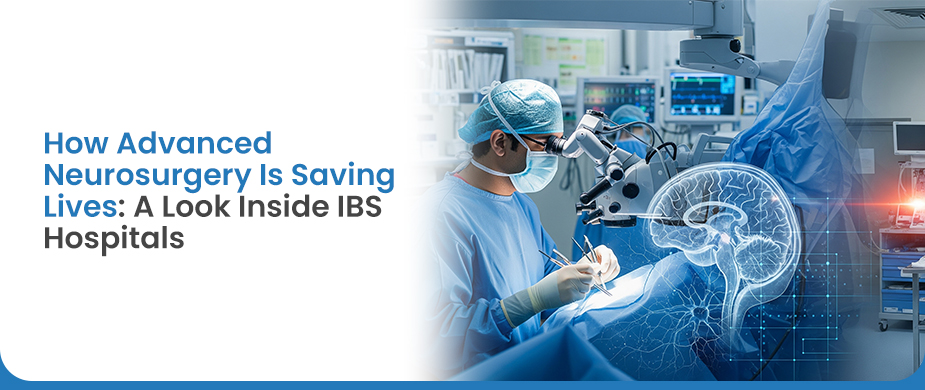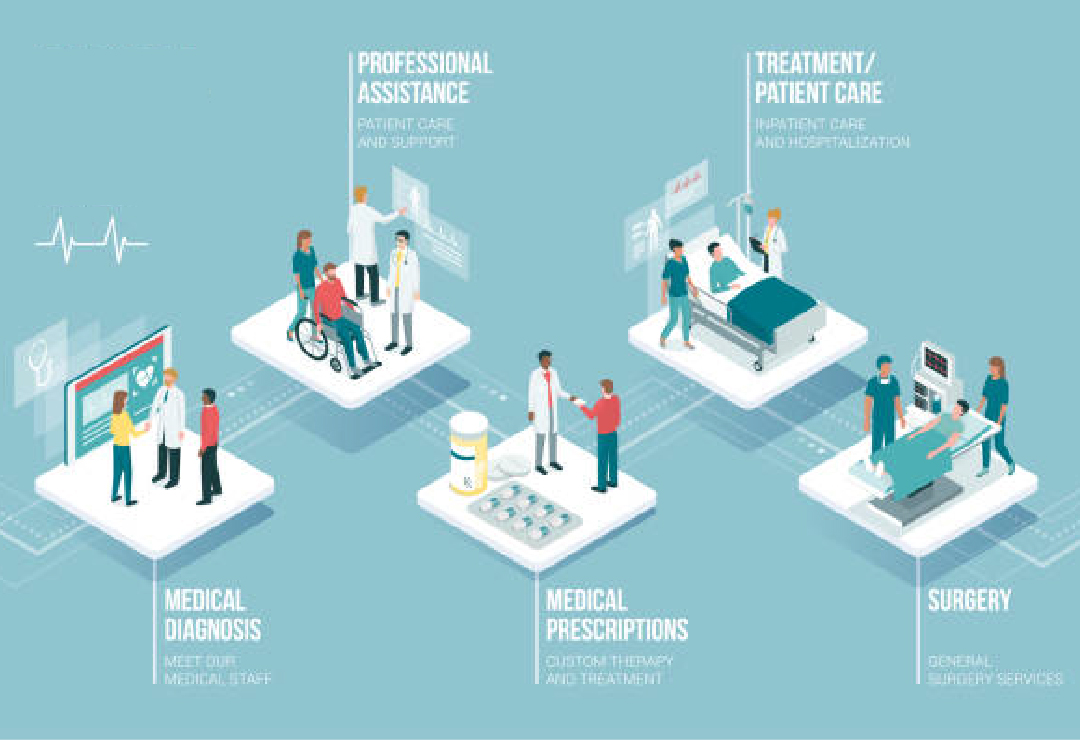
How Advanced Neurosurgery Is Saving Lives: A Look Inside IBS Hospitals
Brain and spine disorders can profoundly impact lives and often require complex surgeries demanding precision and innovation. With advanced neurosurgery techniques, patients are now offered safer, less invasive, and extremely successful treatments than ever before. At IBS Hospitals in Delhi, neurosurgery is pushed to newer dimensions—where pioneering technology, skilled surgeons, and personalized patient care combine to save lives and give hope a new lease of life.
This blog discusses the latest neurosurgery technology in India, benefits of minimally invasive brain surgery, and Delhi neurosurgery success stories that make IBS Hospitals a name to rely on for the treatment of brains and spines. We will also include how advancements in brain surgery in 2025 are determining what direction neurosurgical care is headed.
Read Also: A Closer Look at Types of Spine Surgery
 The Evolution of Advanced Neurosurgery
The Evolution of Advanced Neurosurgery
Neurosurgery is greatly advanced from the old open operations. Brain and spine operations used to translate into massive incisions, extended hospital stays, and higher risks of complications.The introduction of minimally invasive brain surgery has revolutionized the field.Minimally invasive techniques are presented in the guise of small incisions, sophisticated imaging, and robot-assisted movement to access brain and spine structures gently without damaging surrounding tissues.
IBS Hospitals has been at the forefront to adopt these advances, displaying Neurosurgery success stories in Delhi that inspire confidence among patients both in India and globally.
Read Also: The Importance of Timely Stroke Management and Rehabilitation
IBS Hospitals' Latest Neurosurgery Techniques
1. Minimally Invasive Brain Surgery
One of the greatest technological strides in modern neurosurgery is performing very complex brain surgery with a few tiny incisions or natural orifices, reducing trauma and speeding recovery. IBS Hospitals utilizes the methods of neuronavigation and neuroendoscopy to perform procedures such as:
- Removal of brain tumors with minimal destruction of normal brain tissue.
- Clipping and coiling of aneurysms using high-resolution imaging.
- Management of hydrocephalus by endoscopic third ventriculostomy (ETV).
2. Robotic-Assisted Neurosurgery
Neurosurgery has been revolutionized by robotics. With the help of devices like ROSA or neurosurgical robotic arms, surgeons from IBS Hospitals are now able to achieve increased levels of accuracy, particularly for deeply positioned brain tumors or epilepsy surgery. Robotic assistance is particularly important if millimeter accuracy makes or breaks a case.
3. Intraoperative Imaging and Neuronavigation
State-of-the-art neurosurgery in India integrates intraoperative MRI and CT scanning, both of which guide surgeons to confirm intraoperative tumor resection success in real time. IBS Hospitals integrates these with neuronavigation (e.g., brain GPS) to enhance the accuracy of surgery.
4. Awake Brain Surgery
Wake craniotomy is another advanced technique that is employed for the tumor or lesion near critical brain areas that are accountable for speech or movement. Being awake during some portion of the procedure may enable doctors to monitor brain function and avoid destroying crucial areas.
Read Also: Orthopedic Assistance For Back Pain Treatment
Benefits of Minimally Invasive Brain Surgery
Patients at IBS Hospitals have experienced life-changing outcomes through minimally invasive brain surgery.This is why treatment is desirable:
- Shorter recovery periods – Patients can go home within days rather than weeks.
- Less scarring and discomfort – Less cutting results in less post-operative discomfort.
- Fewer complications – There is less interference with healthy tissue, so risks such as infection and bleeding are significantly minimized.
Increased precision: Surgeons can target the diseased area with improved navigation and imaging.
Developments in Spine Surgery
IBS Hospitals is also well-known for its state-of-the-art spine surgeries in addition to brain surgeries. Patients with slipped discs, scoliosis, or spinal tumours can recover quickly and regain their mobility with procedures like minimally invasive spinal fusion, endoscopic discectomy, and robot-assisted spine surgery.
The Newest Neurosurgery Technology in India: IBS Hospitals Setting the Standard IBS Hospitals uses some of the newest technology on the market:
- High-definition neuroendoscopes for clear, sharp images.
- 3D surgical microscopes for precise microsurgery.
- During surgery, intraoperative neuromonitoring (IONM) is used to track nerve function in real time.
- using artificial intelligence (AI) software for risk assessment and pre-surgery planning.
- navigation systems with robot assistance for adjusting and positioning the spine.
These advancements equate to safer procedures and improved long-term outcomes.
2025 Advances in Brain Surgery: What's Next?
Future neurosurgery will feature even more ground-breaking advancements:
- AI-Aided Diagnostics: Machine learning algorithms are being used to predict surgical outcomes and customize treatment regimens for each patient.
- Augmented Reality (AR) Surgery: Using AR headsets, surgeons can increase surgical accuracy by superimposing brain structures.
- Gene and Stem Cell Therapies: Research is being done to find ways to treat conditions like Parkinson's disease and spinal cord injuries by combining regenerative medicine and surgery.
- Fully Robotic Procedures: As robotic neurosurgery becomes more autonomous, it will be able to perform more precise procedures in less time.
Why Choose Neurosurgery at IBS Hospitals?
- Team of Experts: IBS boasts some of Delhi's best neurologists and neurosurgeons.
- All levels of care, from diagnosis to rehabilitation, are provided under one roof with comprehensive care.
- Patient-Centric Approach: A treatment plan tailored to the patient's condition and objectives at each stage.
- International Acceptance: Because IBS hospitals have higher success rates and lower prices than those in Western nations, patients from other countries prefer to visit them.
What Patients Should Know About Neurosurgery Preparation?
Patients undergoing the most recent brain or spine surgery undergo the following tests before surgery:
- MRIs and CT scans.
- Neurological assessment prior to surgery.
- Risks, rehabilitation, and rehabilitation counselling schedules.
In order to ensure a successful operation, pre-surgery planning is carried out in IBS hospitals using simulation on the neuronavigation device.
Post-Operative Care and Recovery
Post-operative care is just as crucial as recovery. IBS Hospitals places a high value on:
- Early mobilisation: To promote a quicker recovery, patients are mobilised 24 to 48 hours in advance.
- Rehabilitation therapies – Physiotherapy, occupational therapy, and speech therapy for patients of brain surgery.
- Emotional support – Psycho-counseling to the patient and family members experiencing surgery fear..
Final Thoughts
The field of neurosurgery is undergoing a revolution, with new techniques making once-risky procedures safer and more efficient.IBS Hospitals in Delhi is the torchbearer of excellence in revolutionary neurosurgery, instilling confidence in patients for getting access to the finest neurosurgery technology in India, benefits of minimally invasive brain surgery, and successful results backed by hundreds of neurosurgery success stories in Delhi.
As we step into the brain surgery advancements of 2025, IBS Hospitals is shattering all boundaries in bringing world-class treatment here in India.
If you or your loved one is under threat with a neurological problem, taking the consultative advice of the professionals at IBS Hospitals can be the beginning of a life-changing cure.
FAQs
Q1. How effective is advanced neurosurgery in IBS Hospitals?
A: Success rates differ with conditions but are 85-95% for operations like tumor removal, operation for epilepsy, and spinal stabilization due to the latest technology and team expertise.
Q2. Is minimally invasive brain surgery safe?
A: Yes. By highly trained neurosurgeons, with state-of-the-art equipment, it is as safe but infinitely more potent than conventional open surgery.
Q3. Why is IBS Hospitals unique in Delhi?
A: IBS offers an integration of state-of-the-art technology, foreign-trained neurosurgeons, and high-quality patient results that simply cannot be found elsewhere.
 By -Dr Aaksha Shukla |
August 01, 2025 | 9 Min Read
By -Dr Aaksha Shukla |
August 01, 2025 | 9 Min Read
10 Early Symptoms of Brain Tumor You Should Never Ignore
How to Choose the Right Neurosurgeon in Delhi NCR
How Stress Affects Brain Health: Neurological Insights
Early Signs of Spinal Disorders in Working Professionals
Epilepsy: Diagnosis and Treatment in Delhi
Stroke Recovery: How a Comprehensive Neuro Rehab Plan Makes the Difference
Early Signs of Brain Tumor You Should Never Ignore
Benefits of Neuro-Navigation in Brain Surgery
Warning Signs Of Stroke You Should Never Ignore
Diagnosing Autism Spectrum Disorders Early: Why It Matters
Spine Surgery vs Physiotherapy: Which Is Better for Back Pain?
World Brain Day 2025: Importance of Brain Health
Parkinson’s Disease vs Essential Tremor: Key Differences
Memory Loss: When Is It a Sign of a Neurological Condition?
How To Reduce Stroke Risk Naturally: Lifestyle Changes For Prevention
Alzheimer’s vs. Dementia: Key Differences Explained
Best Sleep Positions for Back Pain Relief: Tips for Better Sleep
Common Causes of Back Pain in Women
Spinal Fusion Surgery: A Guide to What to Expect Before and After

